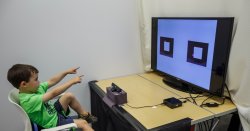The Psychology Department houses a number of research labs, each with its own specific program of psychology research. Becoming a research assistant as an undergraduate or graduate student is an excellent way of building skills essential in the field while working hands-on with the faculty who run these labs.
Some of our labs are listed below, along with their specific research areas. If you are an undergraduate or graduate student interested in any of these areas and want to inquire about research assistant opportunities, please contact the director of the lab or visit the lab website (if provided) for additional information.
Autism and Neurodevelopment Lab
- Director: Dr. Erin Kang
- Areas: autism spectrum disorder; social functioning; evidence-based interventions; social skills training; neurodevelopment and plasticity
Cerebral Lateralization Laboratory
- Director: Dr. Ruth Propper
- Areas: memory, effects of hand preference on behavior/cognition, sleep, emotion, and spatial cognition
Scholarly Community Organizing for Resistance and Equity (SCORE) Lab
- Director: Dr. Milton Fuentes
- Areas: diversity science, mentoring, motivational enhancement, and pedagogy
Cognition and Leadership Development Lab
- Directors: Dr. Laura Lakusta and Dr. Jennifer Bragger
- Areas: We are currently working on the National Science Foundation grant: RUI: Antecedents of Servant Leadership Experiences This study investigates the relationships between developing as a servant leader and (1) Theory of Mind (i.e., understanding another person’s mental states), (2) ability to recognize (i.e., perceive and categorize) the essential characteristics of Servant Leadership, and (3) specific first-hand experience in serving and/or leading. Our current populations of study include college students, the Boy Scouts of America, the Bonner Foundation, and many other profit and non-profit organizations.
- Research assistants have discussions on relevant literature, organize and code data through R and SPSS, and create/administer surveys in Qualtrics. Experience in these tools are not required, and can be learned.
- Research assistants are required to work 8-10 hours a week in our lab space in Dickson Hall. Students have opportunities for publications, conference presentations, and research contributions. This opportunity is typically a volunteer opportunity, but sometimes can be taken as part of a course or Independent Study.Interviews for the research assistant position primarily take place during the spring semester (around March) and training takes place in early June. Students are asked to commit at least one summer and two semesters to the research in order to achieve a deep understanding and involvement of the material. If interested in learning more please contact Dr. Laura Lakusta and Dr. Jennifer Bragger.
- Our press release on this study can be found here – https://www.montclair.edu/chss/2021/10/25/professors-lakusta-and-bragger-receive-grant-for-servant-leadership-research/
Cognition & Neurocognitive Disorders Research Lab
- Director: Dr. Joshua Sandry
- Areas: attention, working memory, long-term memory, cognitive impairment in multiple sclerosis and traumatic brain injury
Cognition, Decision Making and Behavior Lab
- Director: Dr. Michael Bixter
- Areas: decision making; cognition; delay of gratification; group behavior; aging
Cognitive and Language Development Lab
- Director: Dr. Laura Lakusta
- Areas: infant cognitive development, child language development, adults’ representations of events
- Director: Dr. Cheryl Gray
- Areas: social support at work, employee health and well-being
Cyberloafing and Technology at Work Lab
- Director: Dr. Kevin Askew
- Areas: the interaction between technology and human behavior (e.g., employee productivity and satisfaction) at work; causes and consequences of personal computer use at work
Evidence-Based Practices & Interventions in Communities Lab (EPIC)
- Director: Dr. Carrie Masia Warner
- Areas: youth mental health services; evidence-based interventions in school and pediatric medical settings; anxiety and mood disorders
Forensic Mental Health and Correctional Psychology Lab
- Director: Dr. Chris King
- Areas: forensic mental health, including mental health law, and correctional psychology
Information Processing Lab
- Director: Dr. Yoav Arieh
- Areas: selective attention, sensory integration/multisensory processes, auditory perception
- Directors: Dr. Valerie Sessa and Dr. Jennifer Bragger
- Areas: longitudinal assessment of leadership development in college students, shared leadership group study
- Director: Dr. John Paul Wilson
- Areas: social perception; stereotyping and prejudice; the impact on face perception on criminal justice outcomes
Research for Effective Child Anxiety Prevention (RECAP)
- Director: Dr. Jeremy Fox
- Areas: child and adolescent anxiety, temperament and emotion regulation, school mental health
School Assessment and Intervention Laboratory (SAIL)
- Director: Dr. Sally Grapin
- Areas: school-based assessment and intervention practices, multi-tiered systems of support, social justice issues in school psychology
Speech Communication Lab
- Director: Dr. Jennifer Pardo
- Director: Dr. Jennifer Yang
- Areas: wayfinding, visual search, perspective taking, and other spatial cognition phenomena in adults, children, and people with intellectual/developmental disabilities
- Director: Dr. Tina Zottoli
- Areas: Adolescent decision making and legal competencies; guilty plea decision making; wrongful conviction
- Directors: Dr. Jason Dickinson and Dr. Nicole Lytle
- Areas: children’s memory, eyewitness testimony, forensic psychology
Workplace Psychological Constructs (W.P.C.) Lab
- Directors: Dr. Valerie Sessa and Catrina Notari
- Areas: comparative meta-analyses of job embeddedness, job identity, perceived organizational support, and commitment, and other studies meant to help differentiate work-related constructs
Youth Mental Health Service Lab
- Director: Dr. Jazmin Reyes-Portillo
- Areas: mental health disparities among racial and ethnic minority youth suffering from depression, anxiety, and suicidality; the role of technology in youth mental health and how technology can be used to reduce mental health disparities
